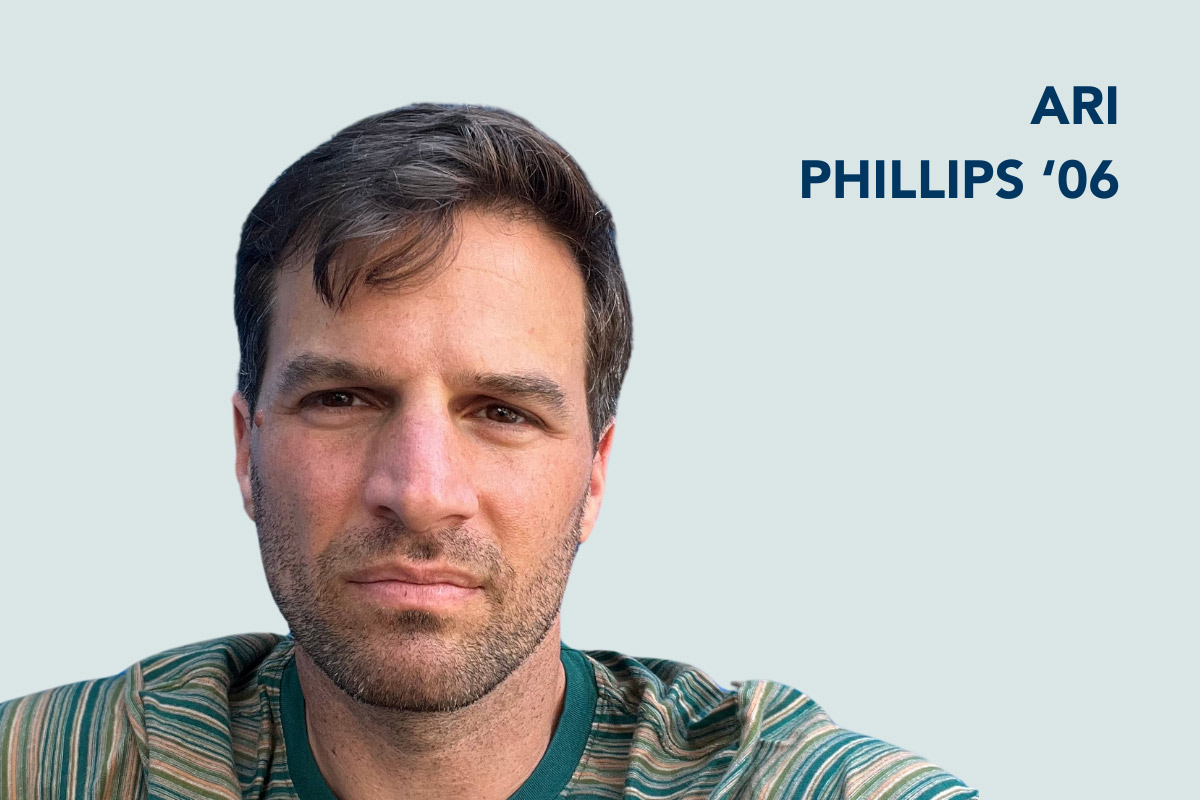
Ari Phillips ‘06 engaged in a unique liberal arts education as an undergraduate philosophy and art student at UC Santa Barbara. This foundation of education paired with a deep appreciation for Santa Barbara’s coastline paved the way for Phillips, as he returned to school for his Masters of Arts in Journalism.
Now, as a climate reporter and editor for an environmental organization, Phillips utilizes his expertise in the field towards another outlet for creativity: fiction writing. In a time-bending tale, his recent novel, Earth Jumped Back, takes readers back to the 1969 Santa Barbara oil spill.
Q: What drew you to study philosophy and art at UC Santa Barbara? How have those studies shaped your post-graduate life?
I started as a physics major but quickly realized I wasn’t that good at it nor that passionate about it. I decided I wanted to approximate a liberal arts education and the balance of philosophy and art appealed to me. In the end, it worked out, alternating between dense texts and creative endeavors. I think it made it so I could underpin my artistic creations with solid ideas that were well thought out (at least I thought they were at the time). In art, I learned a lot about the process of creation, things like how to revise, take feedback, and start fresh. In philosophy, I also learned how to break things down to their basic elements in order to understand them.
My career took a while to get going, but I was never in a hurry. I decided to focus more on writing and went back to school for journalism. Santa Barbara helped nurture my love of the environment, which is also what I focus on now as an editor at an environmental organization.
Q: Can you share a bit about your journey from being a climate reporter to becoming a novelist?
I have the pandemic and having children to thank for my foray into novel writing. These two events reshaped my routine entirely and I found that I needed a creative outlet I wasn’t getting at work. I also got much better at time management. Writing fiction isn’t something that just flows out of me, I really have to sit down and focus. But my background in journalism helped me become a faster writer, which is useful.
Q: How does your work in environmental law influence your writing?
It forces me to keep up with the latest news in the environmental space, which is always interesting and generally seeps into my work. There’s so much happening around energy and climate change and conservation and wildlife, everything from technological breakthroughs to mental health counseling. In a sense, I write what I know and write about what holds my interest. In many cases, this isn’t necessarily the environmental news itself, but how people process it and what it means for society going forward.
Q: Describe your writing process with your novels, first Eat Your Damn Vegetables and now Earth Jumped Back.
I learned early on that there are two kinds of novel writers: planners and pantsers. Planners make detailed plot outlines and lay everything out chapter by chapter before delving into the scene writing and dialogue. Pantsers go by the seat of their pants, meaning they just pretty much start writing and stop at the end of a draft. Of course, people fall somewhere within this spectrum. I like to work on an idea and a very loose outline that probably only covers a third of the book and then one day I just get tired of that and start writing. Once I get going, the important thing is to keep at it. And also to be patient. Rushing is not going to help anything.
Q: Tell me about your inspiration for Earth Jumped Back.
Earth Jumped Back really began with my longtime fixation on the 1969 Santa Barbara oil spill. When I was at UCSB, no one ever really talked about it, but it seemed like such a momentous thing. Then when I started researching, going through the old Nexus archives, I saw that the whole year, 1969-1970, really was a turning point for UCSB and the Santa Barbara area. When I attended UCSB, it was kind of like a dreamland remote from the problems facing the rest of the world. I liked this idea of students being more engaged. I also liked the opportunity to sit at my desk and imagine myself back in Isla Vista.
I made one of my main characters a reporter at the school newspaper because I worked in the advertising section of the Daily Nexis for three years. The job was pretty chill, but I guess it stuck with me, in my pursuit of journalism and now in my novel settings.
Q: What message or experience do you hope readers take away from your books?
That reading is fun. That books should be imaginative, not limited, in their scope. That we let a lot of important things fall under the radar as we become consumed with daily life.
Q: What is on the horizon for you professionally with the release of Earth Jumped Back?
Great question! Let’s just say I’ll be keeping my day job.